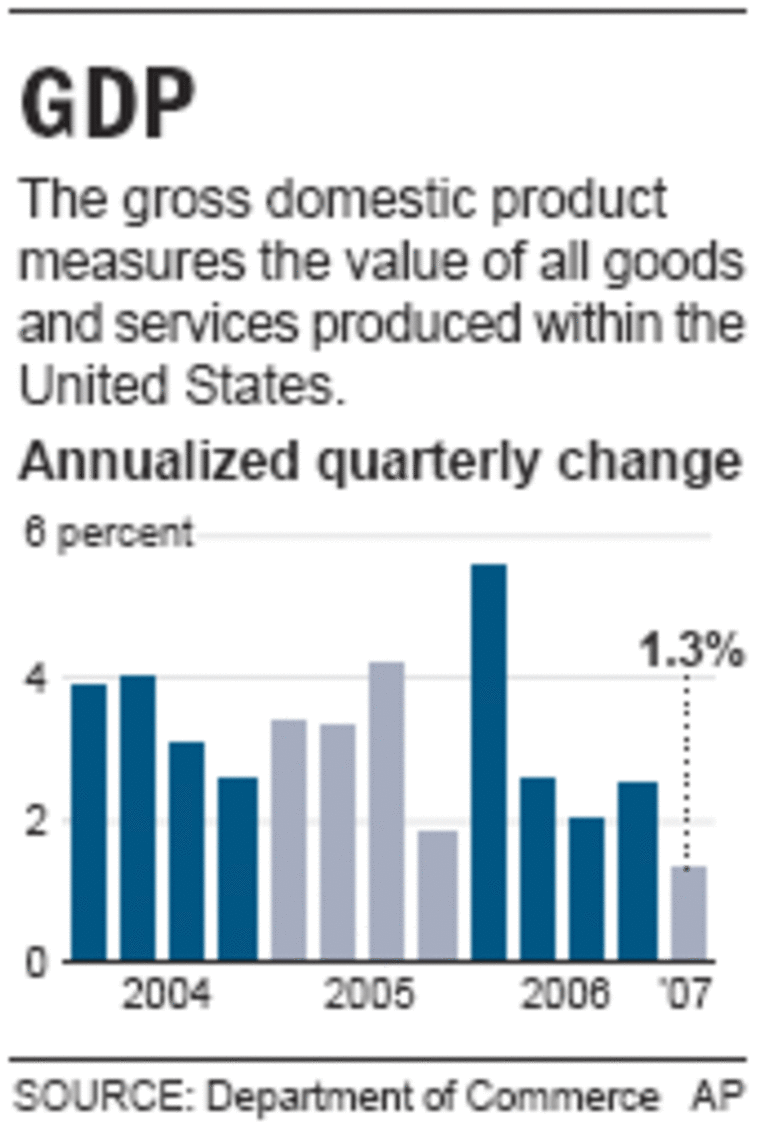Friday’s report showing the U.S. economy grew just 1.3 percent in the first three months of this year — the slowest growth in four years — confirmed that the ongoing housing slump is weighing on the broader economy. And by most accounts, that slump will likely persist well into the year — and possibly longer.
But many economists suggest that a prolonged slowdown may have a silver lining. By stretching out the period of weak growth, the U.S. economy may be able to avoid a full-blown recession.
Consumers — whose spending makes up 70 percent of economic activity —continued to do their part in the first three months of the year to keep the gross domestic product in positive territory. First-quarter consumer spending was up 3.8 percent — only a bit slower than the 4.2 percent growth rate in the fourth quarter of 2006.
So far, that spending has been supported by a solid job market: The nation’s unemployment rate fell to 4.4 percent last month, matching a five-year low. But consumers are beginning to get nervous about the prospects for economic growth. For example, a widely watched gauge of consumer confidence dropped in April.

Meanwhile, the slowdown in housing continues to weigh on the economy. Investment in home building fell at a 17 percent annual rate in the first quarter on top of a 19.8 percent cut on the fourth quarter of last year.
With foreclosures rising, home prices falling and builders sitting on a rising volume of unsold inventory, few expect the housing slump to ease before the end of the year at the earliest. And as builders pull back and real estate agents watch traffic dry up, many economists expect further housing-related job losses later as the housing slump continues.
The drop in home prices is also removing a major source of cash for consumers — home equity refinancing.
“It’s not that there’s no more equity in the house — there is. But the banks aren’t willing to make the home equity loans to extract it in a period in which home prices are going down,” said Brian Fabbri, chief economist at BNP Paribas.
But despite the sluggish growth — and the outlook for continued slow growth this year —inflation is still running higher than the Federal Reserve would like to see.
"It's very important that the Fed maintains its vigilance about inflation, that we not let inflation expectations get out of hand,” said Philadelphia Fed President Charles Plosser last week. “If inflation doesn't moderate as we expect, the Fed would need to think about what appropriate action will be."
That means the waiting game for the Fed to cut interest rates will probably continue for some time.
“Inflation (in the first-quarter GDP report) on a quarterly basis was the highest rate in 16 years,” said Michael Darda, chief economist at MKM Partners. “So to assume the Fed is going to cut rates based on this data, I think, is wrong.”
Strong consumer spending is also helping to fuel a widening trade deficit, as Americans buy more goods made overseas than they sell to the rest of the world. In the first quarter, the trade deficit knocked about a half a point off U.S. GDP.
In the past, a sharp drop in demand for houses and cars would have brought with it a major risk of recession — a painful cure to the excesses of too much growth. But some economists note that since the mid-1980s, the U.S. economy has tended to see fewer extremes: Expansions are more muted and recessions more tame than in prior cycles.
Some have dubbed this phenomenon the "Great Moderation."
A number of explanations have been advanced. Some believe technology has allowed companies to better manage inventory and avoid big build-ups of past recessions. Others point to the Fed's dogged dedication to fighting inflation after prices spiraled out of control in the 1970s. Still others suggest that plain old good luck gets some of the credit.
Whatever the reasons, some economists now believe that barring an external shock to the system, the U.S. economy can muddle along without slipping into a serious downturn. The flip side is that the economy will likely post relatively weak numbers — growth of 2 percent or less — well into next year or longer.
“We probably can avoid recession and keep the expansion only at a very slow rate,” said Fabbri. “That would then continue to add more evidence to this view that the U.S. business cycle has moderated.”
One major wild card: the continued willingness of overseas investors and governments to fund the U.S. trade deficit, which has created a big surplus of dollars in foreign hands. So far, those dollars have been recycled largely through continued buying of U.S. Treasury debt; strong demand for Uncle Sam's bonds helps keep U.S. interest rates low. But many economists believe this demand for U.S. investment is not sustainable, especially as a weak dollar makes investments based in other currencies more attractive.
If that foreign investment starts to dry up, the result would be higher interest rates as the Treasury has to pay higher rates to entice overseas investors and governments to buy U.S. debt. Those higher rates could put a further drag on the U.S. economy. And because long-term rates are set by the credit markets, the impact of cuts in short-term rates by the Fed in propping up weakening U.S. growth would be diluted.